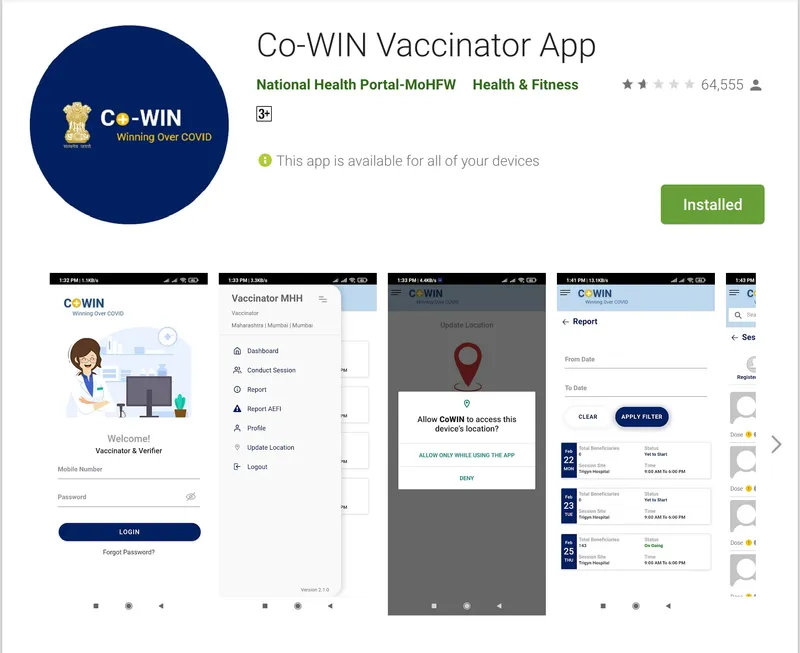Over 50 countries interested in CoWIN, India ready to share open-source software free: R S Sharma
The CoWIN platform has become so popular that as many as 50 countries from Central Asia, Latin America, and Africa all showed interest in having a CoWIN like system, Dr R S Sharma said.
About 50 countries, including Canada, Mexico, Nigeria, and Panama, have shown interest in having a CoWIN-like system to run their vaccination drive, a senior official said, adding India is ready to share the open-source software free of cost.
Dr R S Sharma, Chairman of the empowered group for COVID-19 vaccine administration, said PM Narendra Modi has directed officials to create an open-source version of the platform and give it free of cost to any country that wants it.
The CoWIN platform has become so popular that as many as 50 countries from Central Asia, Latin America, and Africa all showed interest in having a CoWIN like system, Sharma said at the second Public Health Summit 2021 on 'Emerging Imperatives in Strengthening Public Health for India' organised by Confederation of Indian Industry (CII).
He also said a virtual global conclave of health and technology experts from across the world will be held on July 5, where India will share how this system works.
"We are telling the world how this system can work and how we are ready to share an open-source software with any country free of cost. There have been huge interests, starting from Canada, Mexico, Panama, Peru, Azerbaijan, Ukraine, Nigeria, and Uganda," he said.

Image Credits: Playstore
Sources said other countries such as Vietnam, Iraq, Dominican Republic, and the United Arab Emirates have also expressed interest in knowing about the CoWIN platform for implementing it in their own countries to run their own COVID-19 programmes.
In five months, Sharma said, CoWIN has grown to handle over 30 crore registrations and vaccinations.
It is a citizen-centric platform and provides a single source of truth till the district level. From the beginning, it was ensured that the platform can be easily used to schedule, reschedule, and cancel appointments, he said.
Sharma also said that vaccinating 1.3 billion people is not a trivial task, and added that the development of the CoWIN-like platform shows India has the capability to develop such great scalable digital systems.
"People talked of a digital divide in getting the vaccine, but from the beginning, we ensured that it is very easy to get on the platform and schedule, reschedule, or cancel an appointment, and at the same time, if that is not possible, you can call a centre and get it done, and go to common service centres to get an appointment," he said.
He added, "Most importantly, you can go without any appointment to the vaccination centre and get vaccinated. In fact, 80 percent of our people have gone to the centre without an appointment."
On the National Digital Health Mission (NDHM), Sharma said the whole idea is based on the concept that many services can be digitally delivered. The NDHM will house all kinds of databases, which will have a facility for the patient to fetch his/her records.
"One of the silver linings of the Corona period is that we are at ease with digital consultation. The most important outcome of this is going to be the generation of data for researchers and academics," Sharma said.
"India has created digital artefacts such as Aadhar that will enable the delivery of services digitally. One such digital product created is an e-voucher, which is person and purpose-specific and will be launched very soon," he said.
Under Ayushman Bharat, if a person wants to get an X-Ray done and the hospital does not have an X-ray facility, the hospital can issue a digital voucher which goes to the X-Ray diagnostic centre, then the QR code is scanned and money is received and X-Ray is performed. This voucher will be a game-changer, he added.
Delhi AIIMS Director Dr Randeep Guleria said the pandemic has disrupted the healthcare ecosystem and public health infrastructure and has challenged resilience.
"Now, we need to look ahead and strengthen our public health system. We need to be prepared for such a pandemic in future. Our basic aim is to have equitable access in remote areas. Important to look at health as a percentage of GDP, and we should look at 2.5 percent of healthcare expenditure," he said.
Some challenges that need to be met are underinvestment as far as healthcare is concerned. Secondly, the public health system should be driven by tech and data, he added.
There is a need to provide telehealth and tele-diagnostics in rural parts of India, and industry has an important role to play. Also, there is a need for a robust electronic healthcare system, Dr Guleria said.
"Third is the area of human resources. There is a need to increase the doctor-patient and nurse-patient ratio, and the last challenge is that of improving the infrastructure. There is also a need to strengthen the public-private partnership and different models can be looked at. CII is very well positioned to take this further," Dr Guleria said.
Edited by Suman Singh








